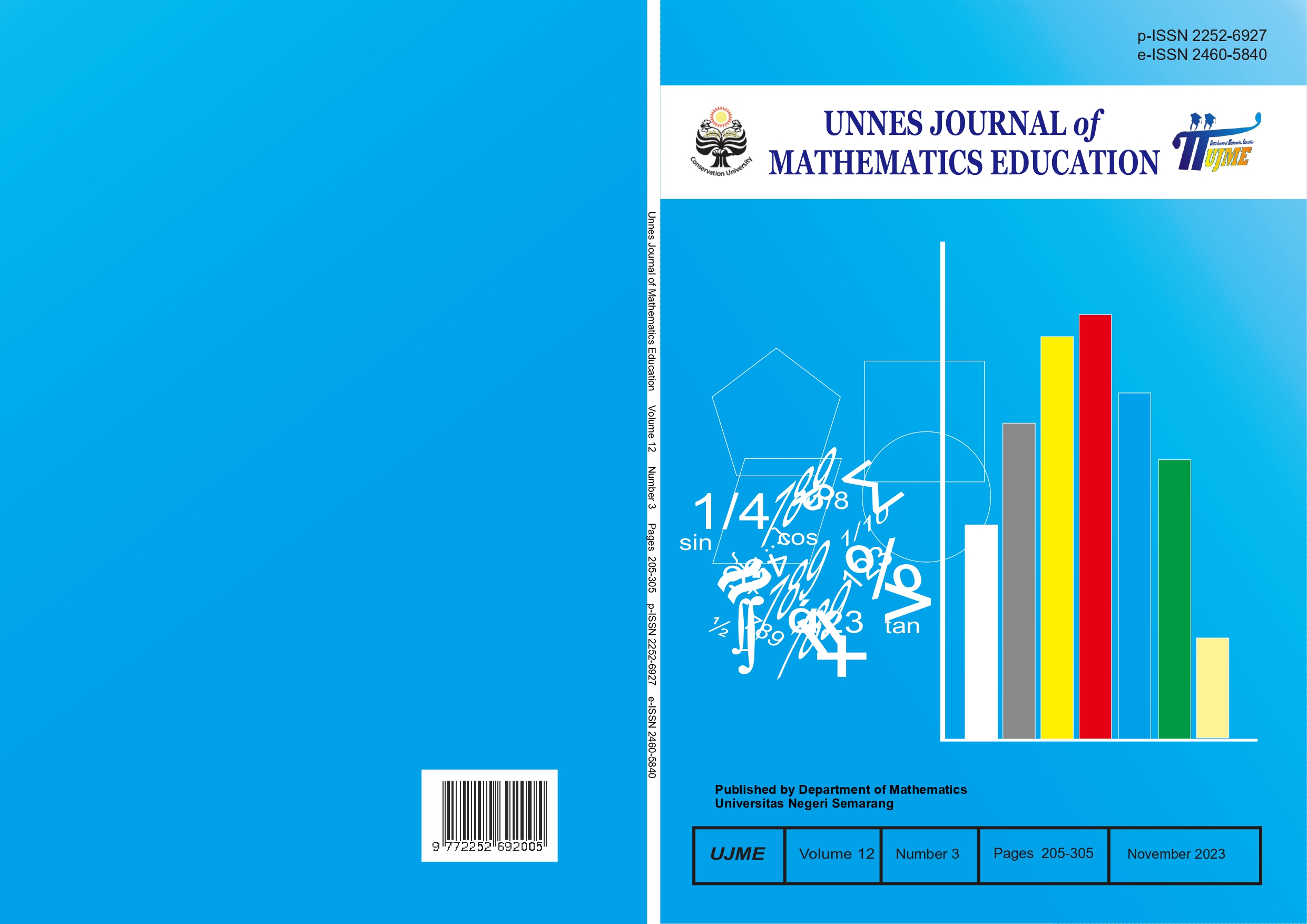Mathematical Critical Thinking Ability Viewed from Students' Habits of Mind in Problem Based Learning Assisted Sevima Edlink
##plugins.themes.academic_pro.article.main##
Abstract
The purposes of carrying out this research were to determine the role of the model Problem Based Learning assisted Sevima Edlink and influence Habits of Mind on the mathematical critical thinking skills of class XI students at SMA Negeri 1 Karanganyar on the basic material of indeterminate integrals. Problem Based Learning assisted Sevima Edlink applied in the learning process in the classroom and integrated into learning resources in the form of student worksheets developed by researchers. Student worksheets developed by researchers have also integrated with contextual approaches and learning models Problem Based Learning with the content of the material and the problems associated with the daily life of students. The research method used in this research was a Mixed Method with models Sequential Explanatory (derivative combination). Activities in this study included learning in class three times for the experimental and control groups, tests of mathematical critical thinking skills for the experimental and control groups, filling out questionnaires for the experimental group, and interviews for the experimental group. The results of this research are Problem Based Learning assisted Sevima Edlink can play a positive role in improving students' mathematical critical thinking skills as shown from the test results and students' mathematical critical thinking skills are also influenced by Habits of Mind. From the research results obtained the learning model Problem Based Learning assisted Sevima Edlink can be one way to improve students' mathematical critical thinking skills. Besides that, it also needs to improve Habits of Mind students, because the higher Habits of Mind students can think critically mathematically will be higher.
##plugins.themes.academic_pro.article.details##
References
Cresswell, J. W. (2014). Research design : qualitative, quantitative, and mixed methods approaches / John W. Creswell. — 4th ed. In News.Ge. SAGE Publications Asia-Pacific Pte. Ltd.
de Araujo, J., Mamoh, O., & Fitriani. (2023). Penerapan Model Pembelajaran Problem Based Learning untuk Meningkatkan Kemampuan Berpikir Kritis Siswa SMP Negeri 2 Tasifeto Timur Pada Materi Geometri. MATH-EDU: Jurnal Ilmu Pendidikan Matematika, Volume 8(Vol 8 No 1 (2023): MATH-EDU: Jurnal Ilmu Pendidikan Matematika), 1–15. https://doi.org/https://doi.org/10.32938/jipm.8.1.2023.1-15
Diana, E. R., & Anugraheni, I. (2022). Efektivitas Model Pembelajaran Discovery Learning dan Inquiry Learning Terhadap Kemampuan Berpikir Kritis Siswa Pada Mata Pelajaran Matematika Kelas V Sekolah Dasar. Jurnal Ilmiah Wahana Pendidikan, 8(16), 612–621. https://medium.com/@arifwicaksanaa/pengertian-use-case-a7e576e1b6bf
Dwirahayu, G., Kustiawati, D., & Bidari, I. (2018). Pengaruh Habits of Mind Terhadap Kemampuan Generalisasi Matematis. Jurnal Penelitian dan Pembelajaran Matematika, 11(2). https://doi.org/10.30870/jppm.v11i2.3757
Jacob, S. M., & Sam, H. K. (2008). Measuring Critical thinking in Problem Solving through Online Discussion Forums in First Year University Mathematics. Lecture Notes in Engineering and Computer Science, I, 19–21.
Khotimah, K., & Nafi’ah, M. I. (2022). Penerapan Kelas Virtual Sevima Edlink dengan Pendekatan Realistik untuk Memecahkan Masalah Matematika Kelas XI MAN 3 Jombang. EDUSCOPE: Jurnal Pendidikan, Pembelajaran, Dan Teknologi, 7(2), 53–60. https://doi.org/10.32764/eduscope.v7i2.2033
Pujiastuti, E., Amalludin, S., & Veronica, R. B. (2016). Keefektifan Problem Based Learning Berbantu Fun Math Book Terhadap Kemampuan Pemecahan Masalah Siswa Kelas VIII. Unnes Journal of Mathematics Education., 5(1), 69–76.
Ramadhana, R. S. A., & Pulungan, S. A. (2021). Pengembangan Lebar Kerja Siswa Berbasis Kontekstual untuk Meningkatkan Kemampuan Penalaran Matematis Siswa SMKS Al-Bukhary Rantauprapat. L-Khawarizmi: Jurnal Pendidikan Matematika, 2(2), 12–17. https://ejurnal.univalabuhanbatu.ac.id/index.php/al-khawarizmi/article/view/529%0Ahttps://ejurnal.univalabuhanbatu.ac.id/index.php/al-khawarizmi/article/download/529/368
Rosmaiyadi, R. (2017). Analisis Kemampuan Berpikir Kritis Matematis Siswa Dalam Learning Cycle 7e Berdasarkan Gaya Belajar. Aksioma Jurnal Pendidikan Matematika FKIP Univ. Muhammadiyah Metro, 6(1), 12–19. https://doi.org/10.24127/ajpm.v6i1.722
Siti, Z. (2018). Mengenal 4c: Learning And Innovation Skills Untuk Menghadapi Era Revolusi Industri 4.0. Universitas Turnojoyo, 2015, 1–18.
Sugiyono. (2021). Metode Penelitian Kuantitatif Kualitatif dan R&D (Sutopo (ed.); 2nd ed.). Alfabeta.
Wijayanto, Z. (2017). Pengembangan Perangkat Pembelajaran Matematika Berbasis Etnomatematika pada Keraton Yogyakarta. SOSIOHUMANIORA: Jurnal Ilmiah Ilmu Sosial Dan Humaniora, 3(1), 80–88. https://doi.org/10.30738/sosio.v3i1.1527
